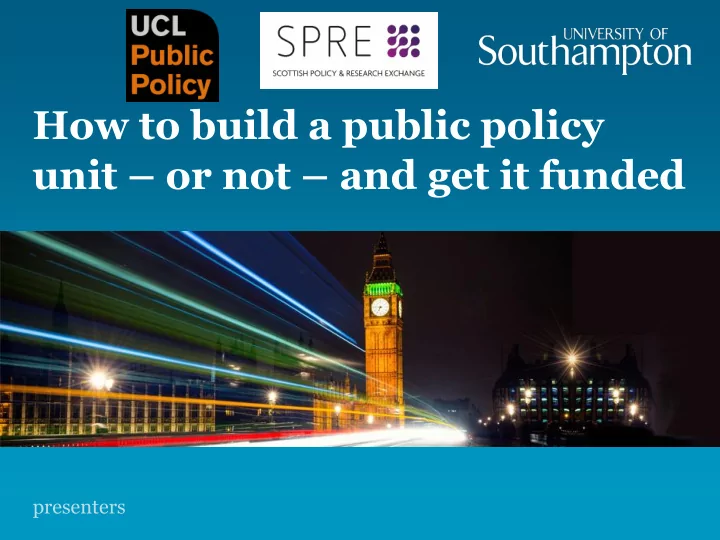

How to build a public policy unit – or not – and get it funded presenters
Traditional barriers for academics 1. Lack of incentives – money, career 2. Lack of knowledge & skills Research Teaching Enterprise Of course some individual academics always had extensive links with policy makers, but limited university-level action or support
Traditional barriers for universities 1. Lack of incentives – resource, slow returns 2. Practicalities & systems – fragmentation, space, 3. Geographies – Teaching Research Enterprise
Development of Public Policy units Nottingham Institute for Policy & Engagement
What’s driving the trend? 1. New Government Money • Research Excellence Framework Research funders demanding impact plans in grants • • Opportunities to bid for specific funding 2. New university incentives (promotion, time allowances) 3. New research opportunities (e.g. access to Government data) 4. Opportunities for students (Placements; MSc projects) 5. Recognition of reputational benefits 6. Increased desire for policy impact
University Policy Team Activities £ $ € ¥ UnknownUnknown author [Public domain], via Wikimedia Commons Academic push – Research Grants – Policy pull – Training – Take research Integrate policy Identify issues Skills for to policymakers impact from start of policymakers academics Washington Redskins Cheerleader by Keith Allison CC BY-SA 2.0 Students – Policy Briefing – Events – Cheerleaders – Productions and In Government External teaching For policy work and placements distribution & Parliament in university
Trends in England & Scotland - Conversation
Exercise 1: Why might your university set up a Public Policy Unit?
Different models for public policy support • Team within a professional service: • Comms & Marketing / Corporate Affairs • Research support • Impact, Public Engagement • Directly reporting to VC/PVC/Dean • Professional service support within a wider academic-led policy research team
Skills • Communication is core skill: • Have to explain and “sell” to both policymakers and your own institutions (eg academics, deans, heads of…) • Translation & writing (eg policy briefs) • Knowledge of your own university • Knowledge of government and Parliament • Budgets
Funding • Core funding – (via REF) • HEIF • Impact Acceleration Accounts • Specific grants for impact activities • Impact work funded through regular grants • Endowments
Exercise 2: Where in your university structure might your university set up a Public Policy Unit?
Benefits? Academics New research & teaching opportunities • • Greater access to funding streams • Career satisfaction Professional Service Staff • Career satisfaction Generating higher levels of creativity and public good • Developing transferable skills • Students • Opportunities for placements (both in Government and in policy team) • Guest lectures/presentations on campus • Advice on careers in public policy Training on policy communication •
Benefits? Wider University • Potential for new income (REF, Research Council grants, direct funding from policy bodies) • Profile raising - goods news stories that work well on Twitter Student opportunities can improve NSS scores • • Potential for improved corporate relations with local authority • Provide a source of expertise of how to invite/get hold of politicians and senior officials for university events
What does success look like? • Some useable evidence to contribute to REF impact case studies • Reputation of university and policy impact of its research (external and internal) • Knowledge and support of public policy activities by VC and senior team • Within budget! • Perceived benefit to grant holders • Opportunities generated for students
Measuring this success is hard!
Things that can go wrong • Lack of support from top of university • Limited communication of existence and function of public policy unit • Have a plan of activity, but no clear idea what constitutes success • Over-enthusiasm – policy team can turn off academics by overpromising, or by being unaware of other draws on academic time • Reallocation of small grants – can be time-consuming and with limited value
Universities Policy Engagement Network • Formalised October 2018 • New grouping of UK universities • Hoping to have greater impact by working together • Will develop best practice • Working with Government & Parliament • Champion the role of policy brokerage
Setting up a new public policy team - conversation
How to convince your university • Get a senior backer (VC, PVC, Dean) • Build a business case • Targets (national, devolved, regional, local) • Funding – Core, HEIF, IAA, REF Impact case studies • Opportunities for staff and students • Benefits vs costs • Link to whatever current university strategy is • Identify where in university the unit should go • Pick some easy wins for first year
Exercise ….? Exercise 3: Plan the case to take to your VC
Alternatives to a public policy team
Final Questions
Stay in touch Dr Olivia Stevenson, Head of Public Policy o.stevenson@ucl.ac.uk, www.ucl.ac.uk/public-policy, @UCLPublicPolicy Gavin Costigan, Public Policy Southampton g.costigan@soton.ac.uk, www.southampton.ac.uk/publicpolicy @PublicPolicyUoS Nick Bibby, Scottish Policy & Research Exchange (SPRE) nick.bibby@spre.scot. www.spre.scot UPEN: www.upen.ac.uk
Recommend
More recommend